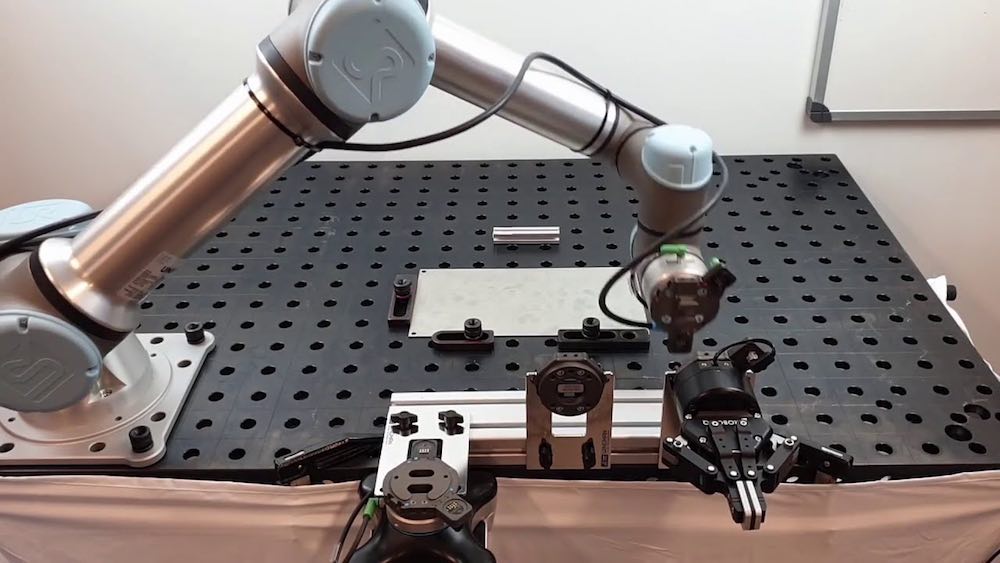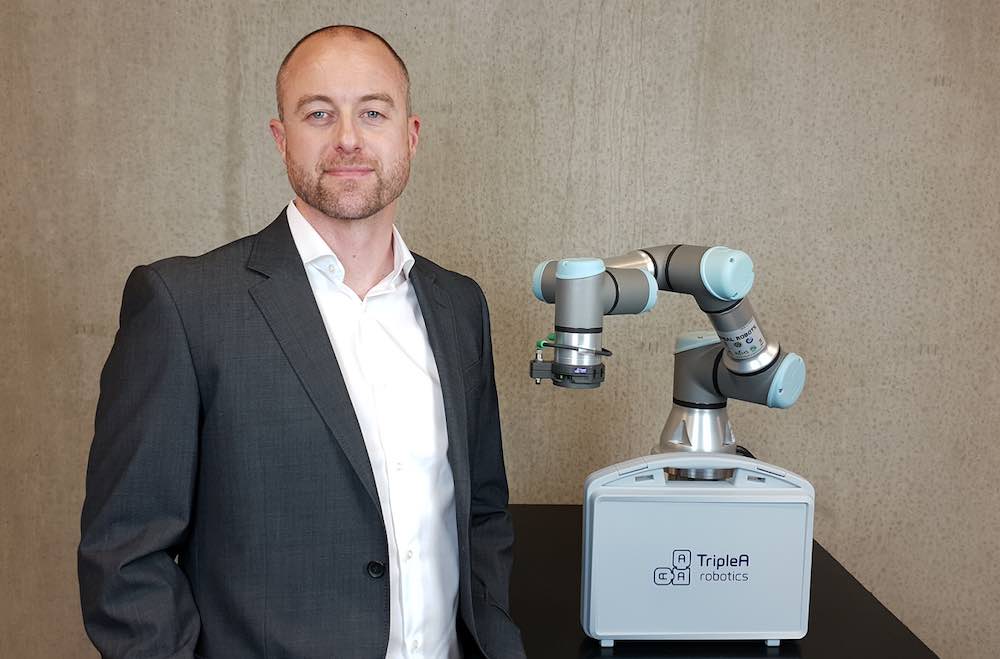|
Listen to this article
|

Last month, Denmark-based TripleA robotics left the Odense Robotics StartUp Hub and launched its first product, the WINGMAN Tool Changer System for collaborative robots. After 18 months in the robotics incubator at the Danish Technological Institute, TripleA robotics exits the hub with a fully developed and tested product, and accelerated company development.
Run by CEO and founder Christian Lyhr Jensen, the company entered the StartUp Hub in the summer of 2019 and left 18 months later ready to take on the robotics industry with a unique product.
“We entered the Hub a year and half ago with a plan and left with a revolutionary product for the cobot market as well as a running business. We saw that the concept of automatic tool change had not yet found its way into the world of collaborative robots, as the traditional old-school automatic tool changers simply did not fit well with the collaborative robot concept,” he said. “We wanted to change that with a new-school automatic tool changer system that would be plug and play within a few minutes on a wide range of cobots and cobot tools.
“To really make an impact in the industry, it would also need to be highly adaptable, very compact, extraordinarily strong, collaborative-safe and it would need to be available at an attractive price – which was almost an impossible goal! Being part of the Odense Robotics StartUp Hub helped us fast-track and reach that goal while working in top notch facilities alongside other startups.”
The WINGMAN Tool Changer System is installed and deployed in only a few minutes and provides fast and easy manual and automatic tool change on cobots, providing them with the flexibility to deploy several tools without human intervention and generate more production output.
“Through perseverance and hard work under the shadow of COVID-19, TripleA robotics has made a product through the StartUp Hub program that is proving to be of great interest to international customers,” said Ernest Clark Fuller, business development manager, startups, Odense Robotics. “They can clearly see the benefits of the tool changer and how it can improve the effectivity of their cobot installations.”
Cluster collaboration and the pandemic
Due to the pandemic and unexpected periods of downtime while waiting on suppliers, TripleA robotics decided on a fresh strategy to cope with the new situation.
“Usually, ‘time-to-market’ is an important factor in product development, as you typically want to launch as soon as possible. However, after the seriousness of COVID-19 became evident in 2020, we decided on a more risky management-oriented strategy and timing the market,” said Jensen. “For one thing that meant we had time to get to know our product really well, do extensive durability tests over several months and complete further iterations. We then launched the product in December, as the vaccines started flowing – about 5 months later than originally planned.
“As we launched, the product was fully developed, thoroughly tested, well documented, and had already proved itself with test customers. The feedback we have received from customers after the launch has been fantastic and our customers have already awarded our efforts as some have come back to buy more. We are very happy about that.”
Testing with popular cobots
While in the Hub, TripleA robotics made full use of the facilities to test the WINGMAN with popular cobots from, among other prominent companies, Universal Robots, OnRobot, Robotiq and Schunk.
“Testing the WINGMAN with products from big cobot players, who are also our role models, was extremely important and would have been quite difficult for us if it wasn’t for the StartUp Hub,” said Jensen. “It allowed us to ensure and document that the WINGMAN can be installed easily and works well with products from the big industry players. This provided us with the necessary experience to support our customers in their specific automatic tool change applications from day one.
“We have tested the WINGMAN on several cobots and many end effectors and until now with 100% success. The WINGMANs Plug and Play versatility has really proven itself.”
TripleA robotics also made the most of the Hub’s facilities by collaborating with Aim Robotics, another startup in the Hub, with whom TripleA robotics shared the same customers and market.
“Proximity to the other startups meant that we could exchange ideas and work together to promote our companies. Collaborating closely with Aim Robotics, we were able to set up an installation to test and document our products, which meant that we could show an even broader range for our products,” said Jensen.

2 successful businesses within the last 3 years
The idea for the WINGMAN first came to Jensen in 2017 while attending a startUp event at the Hub and doing research for his other robotics company, TEKprojekt.
“I resigned [from] my job as a factory manager in early 2017 and started TEKprojekt to satisfy my entrepreneurial eagerness,” he said. “Through TEKprojekt, I would be offering project and risk management to automation integrators while on the lookout for a more scalable business opportunity and likeminded, dedicated people to team up with. While busy in TEKprojekt, I was attending network events and seeking inspiration.
“In mid-2017, I already had a very clear vision for the WINGMAN and for TripleA robotics with a clear product strategy; applicable, adaptable and affordable products. Although TEKprojekt had become a really good business already in 2018, I finished on a good note with my customers in 2019 as TripleA robotics was accepted into Odense Robotics StartUp Hub. That was the plan all along and I haven’t looked back since.”
The WINGMAN has now been on the market since mid-December and several sales have already been made in Europe and the U.S.
Editor’s Note: This article was reprinted with permission from Odense Robotics.





